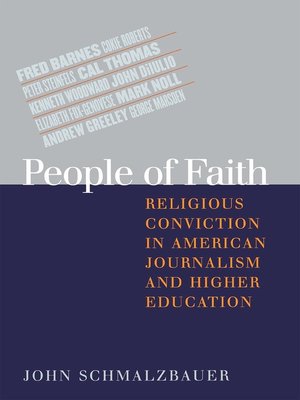People of Faith
ebook ∣ Religious Conviction in American Journalism and Higher Education
By John Schmalzbauer

Sign up to save your library
With an OverDrive account, you can save your favorite libraries for at-a-glance information about availability. Find out more about OverDrive accounts.
Find this title in Libby, the library reading app by OverDrive.



Search for a digital library with this title
Title found at these libraries:
| Loading... |
Over the past two decades, a host of critics have accused American journalism and higher education of being indifferent, even openly hostile, to religious concerns. These professions, more than any others, are said to drive a wedge between facts and values, faith and knowledge, the sacred and the secular. However, a growing number of observers are calling attention to a religious resurgence—journalists are covering religion more frequently and religious scholars in academia are increasingly visible.John Schmalzbauer provides a compelling investigation of the role of Catholic and evangelical Protestant beliefs in the newsroom and the classroom. His interviews with forty prominent journalists and academics reveal how some people of faith seek to preserve their religious identities in purportedly secular professions. What impact, he asks, does their Christianity have on their jobs? What is the place of personal religious conviction in professional life? Individuals featured include the journalists Fred Barnes, Cokie Roberts, Peter Steinfels, Cal Thomas, and Kenneth Woodward, and the scholars John DiIulio, Elizabeth Fox-Genovese, Andrew Greeley, George Marsden, and Mark Noll.Some of the journalists and academics with whom Schmalzbauer spoke qualified displays of personal religious belief with reminders of their own professional credibility, drawing a line between advocacy and objectivity. Schmalzbauer highlights the persistent tensions between the worlds of public endeavor and private belief, yet he maintains there is room for faith even in professional environments that have tended to prize empiricism and detachment over expressions of personal conviction.
|Over the past two decades, a host of critics have accused American journalism and higher education of being indifferent, even openly hostile, to religious concerns. These professions, more than any others, are said to drive a wedge between facts and values, faith and knowledge, the sacred and the secular. However, a growing number of observers are calling attention to a religious resurgence—journalists are covering religion more frequently and religious scholars in academia are increasingly visible.
John Schmalzbauer provides a compelling investigation of the role of Catholic and evangelical Protestant beliefs in the newsroom and the classroom. His interviews with forty prominent journalists and academics reveal how some people of faith seek to preserve their religious identities in purportedly secular professions. What impact, he asks, does their Christianity have on their jobs? What is the place of personal religious conviction in professional life? Individuals featured include the journalists Fred Barnes, Cokie Roberts, Peter Steinfels, Cal Thomas, and Kenneth Woodward, and the scholars John DiIulio, Elizabeth Fox-Genovese, Andrew Greeley, George Marsden, and Mark Noll.
Some of the journalists and academics with whom Schmalzbauer spoke qualified displays of personal religious belief with reminders of their own professional credibility, drawing a line between advocacy and objectivity. Schmalzbauer highlights the persistent tensions between the worlds of public endeavor and private belief, yet he maintains there is room for faith even in professional environments that have tended to prize empiricism and detachment over expressions of personal conviction.






